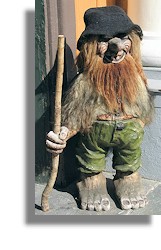

Gaelic and Celtic Customs
from the Hebrides and Beyond
Fada's Farsaing (Far and Wide) is a series of articles by Liam O Caiside in English but with Gaelic words and phrases interwoven in the text. The articles describe a wide range of Gaelic and Celtic customs. These pages were originally published in the "Scottish Radiance" e-magazine and have been reproduced here with the kind permission of the Scottish Radiance editor, Sharma Krauskopf.
The Shetland Trows 
One of the creatures most often a part of the customs of the Shetland Islands were the trolls, known in the Shetlands as trows, --- little people who lived in underground caverns in the hills and whose name is perpetuated in places like Trollhoulland and Trollawater. They were cheerful, happy people, fond of music, good food and drink on the whole the relationship between them and mortals could be described as a tolerant and almost peaceful co-existence in which each respected the strength of the other. (Picture of a Troll/trow via Wikimedia). Never the less the people feared them and took care not to offend them by word or deed. Some of the customs that developed about the trows were:1. When talking about them to refer to them as 'da guid folk' so as not to offend.
2. The trows abhorred untidiness so the Shetlanders always made sure their homes where neat before they went to bed. If the house was clean the trows would bless the house but if dirty the house would be 'witched' for a year and a day.
3. Women who were nursing babies must be careful as the trows might carry off the child and leave an ailing changeling who would remain crippled or an imbecile until it died.
4. The animals must be guarded as the trows would carry off the best cow and leave in its place an almost perfect replica of the cow that would die in a few days.
5. Animals found dead in the hills were mere replicas of the real animals as the real animals would be carried off for a trowie banquet.
6. The only protection for women and animals were an open Bible, a lighted candle or two oat straws laid in a cross.
7. It was believed trows were powerless when confronted with iron so a knife and reaping hook were often placed beside something the people wanted to protect.
8. Men and women who were spirited away to the trows homes and allowed to come back told in great detail of the splendid underground mansion and elegant decorations.
9. Trows loved music and many of the Shetland fiddle songs were learned from the trows. (Musical instrument graphic via Wikimedia)10. If the trows left something behind in a home it would bring good luck.
11. It is believed the power of the trows were broken after the Scottish reformation and they have not been a problem since. In Whalsay in 1850 some fishermen were believed to see the trows gather for departure. In Unst it is believed the trows left the island because they could not stand the preaching of Dr. Ingram, the famous Free Kirk minister who died in 1879. (Graphic of Unst Harbour via Wikimedia).
Source: "Traditional Life in Shetland" by James R. Nicolson
Return to Fada's Farsaig Index
Where else would you like to go in Scotland?

